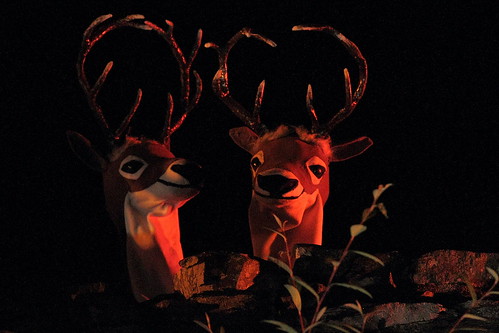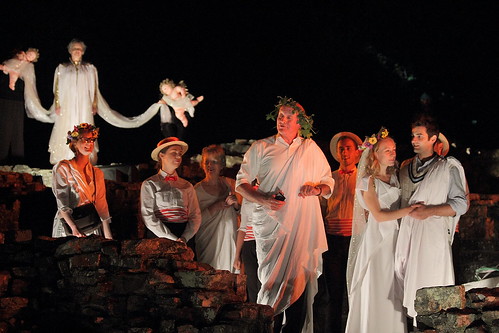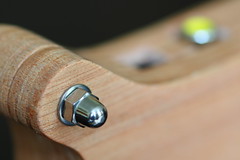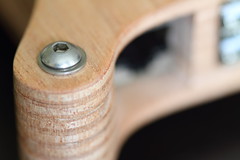---
Office Party
Stephen Whitehead
Distant tinny music filtered along the metal corridors of
the Epsilon Class Explorer Vessel, each note collecting a thin coating of rust
as it went. The vast pressure of vacuum
caused dissonant groans as the panels of the ship’s skin shifted to bare the
load.
Vast pressure of vacuum, she thought, gloomily. Vast, silent
pressure. Briefly she toyed with the
idea of spacing the entire worthless lot of them as they gyrated and flirted
their way towards a paralytic coma.
“Christmas...” she sighed.
She’d grown up an Ep-Ex rat, living her entire life in the
confined space of a ship designed exclusively to travel as far and as cheap as
possible. Not for her verdant
vistas. Even when they found an
interesting spot in the galaxy, she stayed firmly in the cabin which was home,
work and comfort. She flew. The crew explored.
The crew. Every
three years a new bunch of candidates.
Slung deep through the void on a gravity well and then cruising the
solar currents in search of something new, interesting and, preferably,
extraordinarily valuable. Bunch of warp-drive
wannabes. Not one had any idea what
their life would become. They dreamt of
glory and adventure but soon realised they’d have to drink away the next three
years of their life or go mad in the dark expanse she so loved.
“The child is a
King, the Carollers sing,
The old has passed,
there's a new beginning...”
Not that drinking your life away was always a bad idea,
she thought to herself, head dropping in defeat.
The damp tinsel tacked with hot glue and hope to the
bulkheads wafted in the scant airflow afforded by the recirculation unit. The goldish fronds clumping like some wet
animal.
It was at that point her entirely relative calm was
broken.
Judd was a typical adventuring space pirate quarterback. Why a six foot four pile of muscle and teeth
would take a job in the cramped confines of a space craft, she couldn't....well, actually, she could guess.
On his bare bicep was a passable representation of the ship complete
with the date of departure and, rather optimistically she felt, return. This was to be his great story. No doubt he had already picked out the
rocking chair from which he would recite great tales of daring do to the
hundred or so grandchildren he could already name. Juddson.
Judd Jnr Jnr. Juddette.
“Join us!” He
gestured with a foamy bottle of many-times-recycled beer.
“I’d rather not.”
She turned away to the rows of instruments – lights with every right and
reason to flash multicoloured. This,
however, did not deter him.
“Captain, I really feel like we've not hit it off like I wish
we had...”
She aimed an eyebrow at him, usually enough to send any
one of them scurrying. But not Judd, probably
thanks to numbing cheer. He merely
slumped into the worn foam sling-shaped navigator’s perch, his bulky knee
thudding against her dainty zero-g adapted joint.
“ I've got a story for you!” he enthused, his face bursting
into a sly grin.
“Ooooohhhh...” his face fell and she marginally corrected
the nosedive of her response, “...good.”
Her tone didn't rise with any hint of enthusiasm, but a lack of outright
threat seemed enough to convince Judd that his story was perhaps the greatest
idea he’d ever had. To be fair, she
thought, this could well be the case.
“There was this other Epsilon class a few years back a
mate of mine was on, came across a habited world covered in the greenest grass you've ever seen. Fruit growing
everywhere. Only two species of sentient
life on the whole planet – some sea mammals look like bright orange whales
filtering algae in the seas – and these furry little primates who harvest fruit
on the land. No biggie, right? No real trade potential – the algae wasn't bad, but eat a bowl and you end up as orange as the whales.”
Despite herself, the captain snorted – the irony of a
drink-flushed boy criticising those of unusual hue was unintentionally hilarious.
“No language, no buildings, no clothes even. They spent all year wandering around naked
eating fruit and getting fat. They sound
simple, right? But they had this weird
orb thing, some kind of computer.” He
flicked idly at a kumquat-sized glittery bauble precariously attached to the main
engine core release. “ Didn't seem to
actually do anything for them, but every
few days the primates came over and pressed their hand against it,” he let the
shiny ball roll against his hand, “and there’s this flash of light and...well...nothing. Tech guys figured it to be some kind of
scanner.”
She was impressed, thinking that the orb would turn out
to be a weapon and the story inevitably descend into epic, culminating in an
intergalactic battle for Truth, Honour and probably some kind of apple based
pudding.
“So, anyway, as they’re observing, winter comes by,” he
gestured around at the tinsel, as if it spoke of something as organic as a
season, “and by come by, I mean WHAM,
two days later the grass is all sparkly white and even the seas have iced
over. The whales dived deep and entered
some kind of hibernation. But top side
is where it gets interesting.”
He leaned closer, voice dropping. She could smell the stale booze on his breath
and the biological results of scant water reserves. His eyes, though, still sparkled and she
found herself unwilling to halt the story.
“When warm, the little guys were all spread out across
the land. But as soon as it got chilly,
they scurried back to the orb, clustering around it like it was some great big
heater. And the techs said that yes, it
was giving off a faint heat. Like,
maybe, a couple cups of coffee-worth!
But still, they snuggled up close to it, maybe ten thousand of ‘em. We threw up an IR filter, and sure enough,
right at the centre they were warm as an ostrich in clover,”
She blinked, but he didn't pause. Or explain.
“...and they kept moving, milling around like a mass of
electrons circling the nucleus of an atom.
But those little electrons, they started to fade.”
He flicked the sparkly decoration, sending it spiralling
around madly. Light caught and flickered
across the room. Irritated, she grabbed
at it, carefully lifted it from the bank of switches, placed it under the heel
of her boot, and with one deliberate squeeze, shattered the delicate ball.
He gulped.
“Get on with it, okay?”
“Okay,” he mumbled, suddenly much less sure of himself. “Er, the ones on the edge started to die. Just not warm enough, right? But their friends didn't stop to mourn or
bury or burn or whatever. They just kept
moving with three or four dying every hour.
Soon there was a thick wall of furry frozen bodies surrounding this
circle of little guys buzzing about. And
the more died, the less the wind got in.
But the less heat they were all producing. So it kept pretty stable. And this carried on for well over a hundred
cycles, them getting thinner and thinner and the bodies piling up.”
She almost asked why no one did anything to stop this,
but everyone knew that you couldn't interfere.
You could convince them to sign away half the wealth of their entire
planet in exchange for a plastic singing Santa (and given the distant rendition
of ‘Rocking Around the Christmas Tree’, she could almost support that policy),
but stop a race from wiping themselves out and suddenly you weren't respecting
their cultural autonomy.
“And all the time they kept touching this orb thing. It was only by the time the numbers were way
down, less than a hundred, we realised that the flash of light changed with the
different beings. What’s more, the
shorter the flash, the closer to the edge they then went. The longer the flash, the closer to the
centre they stayed. Until finally only
two were left. And on that day, the
winter lifted. The grass was green in a
few hours. But,” suddenly the greasy
smile returned, “there was one thing the pair were left to do...”
She looked at him, could barely bring herself to say it. “Repopulate the planet?”
His face split open, emanating an horrific glee like
radiation.
“Well I thought we might just start with dinner, but OKAY!”
As he leaned towards her, she thrust an arm forward, her
nimble fingers catching his flushed nose like a prize salmon.
“All that was some kind of,” she paused, letting
sufficient bile rise to colour her words bright green, “COME ON?”
He was struck dumb, the stinging pain of his predicament
causing tears to leap to his suddenly fearful eyes.
She sighed, letting go of him abruptly so that he tumbled
from his seat and landed in a crumpled mess on the chequer plate deck.
“Christmas.” she muttered under her breath as she left
the room.






















